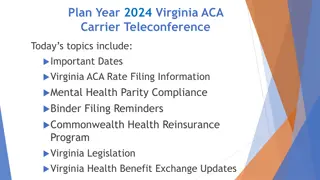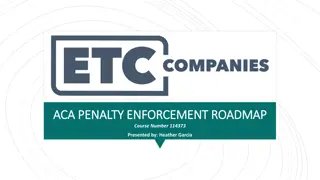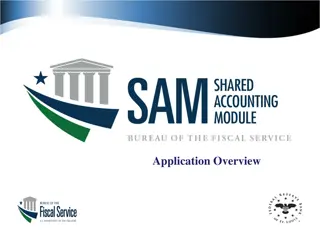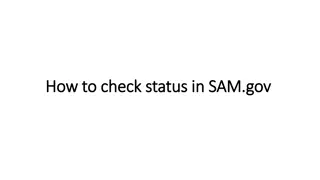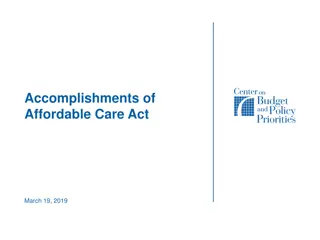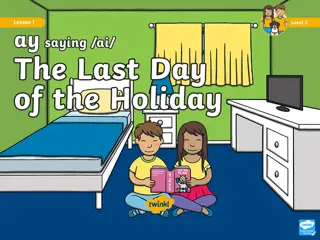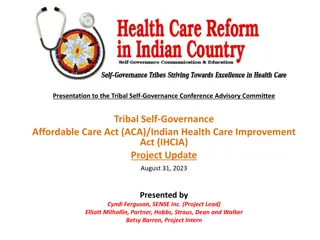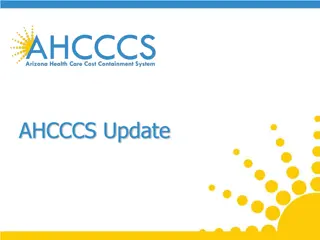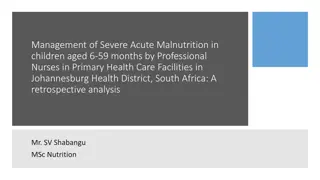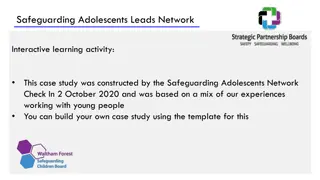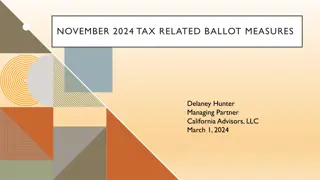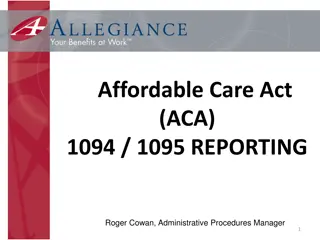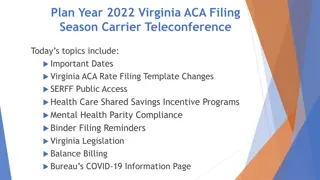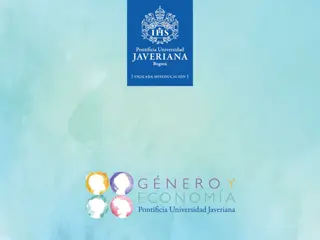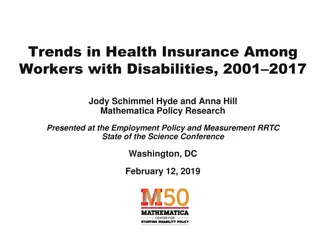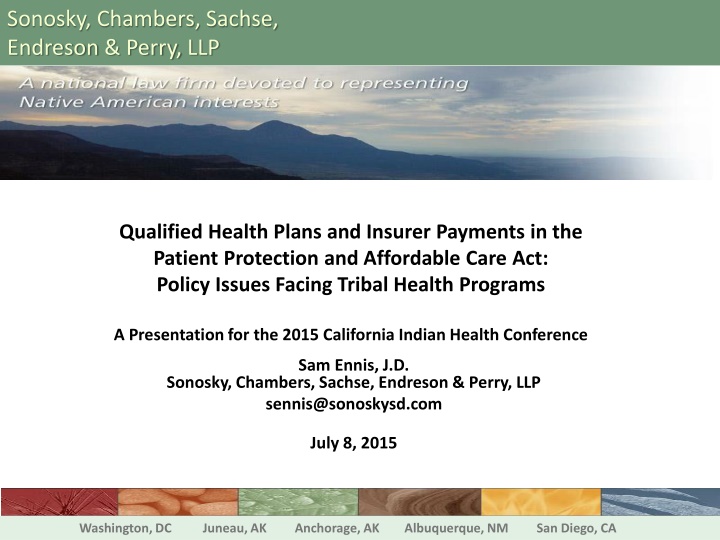
Cost-Sharing Reductions for Tribal Health Programs
Explore the policy issues surrounding cost-sharing reductions in the Patient Protection and Affordable Care Act (ACA) for Tribal Health Programs. Learn about the zero and limited cost-sharing variations available to American Indian and Alaska Native individuals, ensuring access to essential health benefits without financial burden. Stay informed on how Qualified Health Plan issuers in ACA Marketplaces offer these reductions to eligible enrollees, benefiting members of federally recognized Indian Tribes and Alaska Native Villages.
Download Presentation

Please find below an Image/Link to download the presentation.
The content on the website is provided AS IS for your information and personal use only. It may not be sold, licensed, or shared on other websites without obtaining consent from the author. If you encounter any issues during the download, it is possible that the publisher has removed the file from their server.
You are allowed to download the files provided on this website for personal or commercial use, subject to the condition that they are used lawfully. All files are the property of their respective owners.
The content on the website is provided AS IS for your information and personal use only. It may not be sold, licensed, or shared on other websites without obtaining consent from the author.
E N D
Presentation Transcript
Sonosky, Chambers, Sachse, Endreson & Perry, LLP Qualified Health Plans and Insurer Payments in the Patient Protection and Affordable Care Act: Policy Issues Facing Tribal Health Programs A Presentation for the 2015 California Indian Health Conference Sam Ennis, J.D. Sonosky, Chambers, Sachse, Endreson & Perry, LLP sennis@sonoskysd.com July 8, 2015 Washington, DC Juneau, AK Anchorage, AK Albuquerque, NM San Diego, CA
Indian Cost-Sharing Reductions Sonosky, Chambers, Sachse, Endreson & Perry, LLP CRIHB/NPAIHB, July 8, 2015 Affordable Care Act Overview Slide 2
Cost-Sharing Reductions - Generally Two American Indian and Alaska Native (AI/AN)-specific cost-sharing reductions (CSRs) for Affordable Care Act (ACA) Marketplace plans. For purposes of rule, cost-sharing includes copayments, coinsurance, deductibles, and similar charges, but does not include premium costs. Qualified health plan (QHP) issuers in ACA Marketplaces must offer variations of their QHPs that incorporate the reductions. Reductions are only available to enrollees in Marketplace plans. QHP issuer cannot withhold CSR amounts from payment to provider, but rather will be reimbursed those amounts by the federal government. Reductions are only available to Indians as defined in the ACA: Members of federally-recognized Indian Tribes and Alaska Native Villages. Alaska Native Claims Settlement Act (ANCSA) corporation shareholders. Sonosky, Chambers, Sachse, Endreson & Perry, LLP CRIHB/NPAIHB, July 8, 2015 Affordable Care Act Overview Slide 3
Zero Cost-Sharing Variation The zero cost-sharing plan variation is available to AI/ANs who (1) have a household income between 100% and 300% of the federal poverty level and (2) qualify for premium tax credits in an ACA Marketplace. Enrollee does not pay any cost-sharing whatsoever when receiving a service deemed to be an essential health benefit under the plan. This is true regardless of where the individual received the service. Sonosky, Chambers, Sachse, Endreson & Perry, LLP CRIHB/NPAIHB, July 8, 2015 Affordable Care Act Overview Slide 4
Limited Cost-Sharing Variation The limited cost-sharing plan variation applies to any AI/AN who does not qualify for a zero cost-sharing variation due to income level or ineligibility for tax credits. Eligibility applies based solely on AI/AN status, not income. Enrollee does not pay anycost-sharing whatsoever when receiving a service deemed to be an essential health benefit under the plan so long as the service was provided: By the Indian Health Service, a Tribal health program, or an Urban Indian Organization (I/T/U); or By a non-I/T/U provider through purchased/referred care (formerly contract health services). Sonosky, Chambers, Sachse, Endreson & Perry, LLP CRIHB/NPAIHB, July 8, 2015 Affordable Care Act Overview Slide 5
AI/AN Cost-Sharing - Difficulties The Centers for Medicare and Medicaid Services (CMS) and Center for Consumer Information and Insurance Oversight (CCIIO) have issued inconsistent interpretations of CSR rules: Stating that there are income-based requirements for limited cost-sharing variation plan eligibility, or that eligibility is tied to tax credit eligibility. Stating that zero-cost sharing variations are available to any Indian under 300% of poverty, not between 100-300% of poverty. Concern that some QHP issuers and Marketplaces might be implementing eligibility for the Indian-specific CSRs in accordance with inaccurate federal guidance. Sonosky, Chambers, Sachse, Endreson & Perry, LLP CRIHB/NPAIHB, July 8, 2015 Affordable Care Act Overview Slide 6
AI/AN Cost-Sharing Specific Complaints CMS issued Bulletin saying that AI/ANs with household income under 100% FPL or over 400% FPL are not eligible for either zero or limited CSR plans, but rather will not have out of pocket cost for services provided by Indian health programs. In federally-facilitated Marketplaces (such as Idaho, Oregon), eligibility determination letters for limited cost-sharing plans contains confusing language concerning scope of CSRs and failing to identify plan type. QHP issuers improperly deduct CSR amounts from payment to providers. QHP issuers fail to properly apply CSRs to eligible AI/ANs (primarily limited cost-sharing variation). Sonosky, Chambers, Sachse, Endreson & Perry, LLP CRIHB/NPAIHB, July 8, 2015 Affordable Care Act Overview Slide 7
QHPs: Network Adequacy Sonosky, Chambers, Sachse, Endreson & Perry, LLP CRIHB/NPAIHB, July 8, 2015 Affordable Care Act Overview Slide 8
QHPs Network Adequacy ACA require QHP issuers to have a sufficient number and geographic distribution of essential community providers, where available, to ensure reasonable and timely access to a broad range of such providers for low-income, medically underserved individuals in the QHP's service area, in accordance with the Exchange's network adequacy standards. Essential community providers (ECPs) are providers that serve predominantly low-income, medically underserved individuals, and include, but are not limited to, safety net providers that are eligible to participate in the 340B Drug Pricing Program in these categories: Federally Qualified Health Centers (FQHCs), Ryan White providers, family planning providers, I/T/Us, and various specified hospitals. Sonosky, Chambers, Sachse, Endreson & Perry, LLP CRIHB/NPAIHB, July 8, 2015 Affordable Care Act Overview Slide 9
Network Adequacy General Standards CMS/CCIIO requirements only apply to federally-facilitated Marketplaces (FFMs). Network adequacy standards in state-based Marketplaces (SBMs) are determined by the State. General requirements for FFM network adequacy include: Network has sufficient numbers and types of providers, including providers that specialize in mental health and substance abuse services, to assure that all services will be accessible without unreasonable delay. QHP makes its provider directory available to the Marketplace for publication online and to potential enrollees in hard copy upon request, and in it identifies network providers that are not taking new patients. Sonosky, Chambers, Sachse, Endreson & Perry, LLP CRIHB/NPAIHB, July 8, 2015 Affordable Care Act Overview Slide 10
Network Adequacy Tribal Health Programs CMS/CCIIO issue an annual Issuer Letter that details additional requirements for meeting FFM network adequacy requirements, including: Offer contracts to all Indian health providers in the QHP s geographic area; Offers good faith contracts, meaning that the terms, including payment rates, represent what a similarly-situated, non-ECP provider would accept or already has accepted; Offer contracts using the recommended model QHP Addendum for [Indian health care programs] developed by CMS, aka the Indian addendum that outlines special legal rights of Tribal providers; Ensure that at least 30% of ECPs in each QHP s service area are included in the provider network. Failure to comply requires written narrative justification that the network (1) established provides an adequate level of service for low-income and medically underserved enrollees and (2) satisfied the good faith contract offer requirement with Tribal health programs. Sonosky, Chambers, Sachse, Endreson & Perry, LLP CRIHB/NPAIHB, July 8, 2015 Affordable Care Act Overview Slide 11
Network Adequacy Ongoing Issues Lack of Tribal-specific protections at the State level lead to inadequate I/T/U network status in SBMs. For example, Nevada does not require issuers to contract with I/T/Us or offer the Indian addendum, and there have been no QHP contract offers to any Nevada I/T/U. Numerous QHPs certified as having adequate networks despite little to no I/T/U presence. Unsure how federal government is enforcing network adequacy requirements, including provider narrative justification. Several QHPs have offered in-network status to I/T/U providers on unfavorable terms. Unsure how federal government is enforcing good faith contract offer requirements. Sonosky, Chambers, Sachse, Endreson & Perry, LLP CRIHB/NPAIHB, July 8, 2015 Affordable Care Act Overview Slide 12
Tribal Right of Recovery Under Section 206 Sonosky, Chambers, Sachse, Endreson & Perry, LLP CRIHB/NPAIHB, July 8, 2015 Affordable Care Act Overview Slide 13
Section 206 - Generally Section 206 of the Indian Health Care Improvement Act (25 U.S.C. 1621e) gives Tribal health programs the right to recover from an insurance company, health maintenance organization, employee benefit plan, third- party tortfeasor, or any other responsible or liable third party (including a political subdivision or local governmental entity of a State), either: The program s reasonable charges billed, or; If higher than the provider s reasonable charges, the highest amount the third party would pay for care and services furnished by providers other than governmental entities, to any individual to the same extent that such individual, or any nongovernmental provider of such services, would be eligible to receive damages, reimbursement, or indemnification for such charges or expenses if such services had been provided by a nongovernmental provider; and such individual had been required to pay such charges or expenses and did pay such charges or expenses. Sonosky, Chambers, Sachse, Endreson & Perry, LLP CRIHB/NPAIHB, July 8, 2015 Affordable Care Act Overview Slide 14
Section 206 Premera Litigation In May 2012, the Alaska Native Tribal Health Consortium (ANTHC) sued Premera Blue Cross Blue Shield (Premera) in federal district court in Alaska seeking to recover under Section 206. ANTHC and Premera had a contract that ANTHC terminated in 2011 after Premera unilaterally amended the contract in its own favor. Premera s subsequent payments to ANTHC were anywhere from 0%-60% of its billed charges. ANTHC sued to recover pursuant to Section 206. Case is currently still active after four rounds of summary judgment, numerous evidentiary challenges, and multiple failed settlement negotiations. Parties are currently putting together a judicial settlement conference for the fall of 2015 per the judge s request. Sonosky, Chambers, Sachse, Endreson & Perry, LLP CRIHB/NPAIHB, July 8, 2015 Affordable Care Act Overview Slide 15
Premera Rulings Thus Far Judge has made the following rulings re: Section 206: Section 206 right of recovery does not apply if the provider and payor have an active contract. Highest amount paid clause refers to geographic area in which provider operates, not the entirety of insurer s nationwide network. Reasonable charges clause and highest amount paid clause represent separate rights of recovery (in Alaska, latter clause determined according to state regulation setting out minimum payments to non-contracted providers). Reasonable charges not limited to what insurer would reimburse individual patient (i.e., this is not a subrogation clause). Insurer cannot deduct cost-sharing (copays, deductibles, coinsurance) from amounts paid under reasonable charges clause, but might be allowed to do so under the highest amount paid clause. Sonosky, Chambers, Sachse, Endreson & Perry, LLP CRIHB/NPAIHB, July 8, 2015 Affordable Care Act Overview Slide 16
Premera Ongoing Disputes What constitutes a reasonable billed charge? ANTHC argues that reasonableness is determined by comparison of billed charges among provider s peer group. Premera argues that reasonableness is determined by comparing payments made by insurers to providers (i.e., insurers alone decide what is reasonable ). When evaluating insurer payment rates, what charges to include? ANTHC says you only examine charges from non-contracted payors since Section 206 does not apply when you have a contract. Premera says you must examine all charges, both contracted and non- contracted. Sonosky, Chambers, Sachse, Endreson & Perry, LLP CRIHB/NPAIHB, July 8, 2015 Affordable Care Act Overview Slide 17
Section 206 What are Reasonable Charges? Judge held the following factors are relevant to reasonableness: An analysis of the relevant market for hospital services; The hospital s internal cost structure; The nature of the services provided; The average payment the provider would have accepted as full payment from third-parties; The usual and customary rate the hospital charges; and The price an average patient would agree to pay for the service at issue. Judge acknowledged that latter two factors are less applicable in I/T/U context because AI/AN patients are not billed and do not pay for services. Judge further noted that these factors must be established by expert testimony (unclear exactly how to do so). Sonosky, Chambers, Sachse, Endreson & Perry, LLP CRIHB/NPAIHB, July 8, 2015 Affordable Care Act Overview Slide 18
Section 206 Lessons Learned Be satisfied with your contract! Contract terms trump Section 206 (at least in Alaska ). For non-contracted payors, understand your payments. Payors cannot apply allowed amounts or other cost-sharing deductions to your reasonable billed charges when paying you under Section 206. Don t be afraid to press your rights Many insurers are unaware of Section 206 or do not understand how it works. Upon being given an explanation several insurers have changed their payment policies in accordance with the law. but recognize the risk in doing so. Some insurers have already issued letters to I/T/U indicating they will immediately comply with Section 206. Premera has litigated the issue for over three years. Be prepared for the latter. Sonosky, Chambers, Sachse, Endreson & Perry, LLP CRIHB/NPAIHB, July 8, 2015 Affordable Care Act Overview Slide 19
Presenter Sam Ennis is an associate in the San Diego office of Sonosky, Chambers, Sachse, Endreson & Perry LLP, which specializes in representing Tribal interests throughout the United States. Mr. Ennis works in all areas of the firm's practice, with a focus on health law and Tribal self-governance. Mr. Ennis graduated with honors from the University of Virginia, and then from the UCLA School of Law, where he was Chief Comments Editor of the UCLA Law Review, interned at the United States Commission on Civil Rights, and participated in the UCLA Tribal Legal Development Clinic. Mr. Ennis is a member of the National Indian Health Board Medicare & Medicaid Policy Committee and has worked in conjunction with the Centers for Medicare and Medicaid Services Tribal Technical Advisory Group. He also serves as a consultant to the National Indian Health Board with regard to training on and implementation of the Affordable Care Act and Indian Health Care Improvement Act. He has authored numerous published articles on various aspects of Federal Indian law. Sonosky, Chambers, Sachse, Endreson & Perry, LLP CRIHB/NPAIHB, July 8, 2015 Affordable Care Act Overview Slide 20


